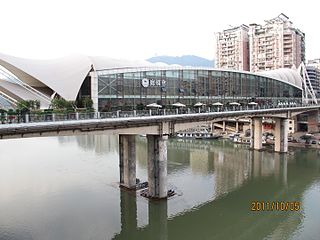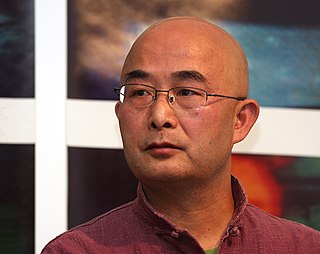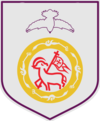Related Research Articles

Sichuan is a province in Southwestern China occupying most of the Sichuan Basin and the easternmost part of the Tibetan Plateau between the Jinsha River on the west, the Daba Mountains in the north and the Yungui Plateau to the south. Sichuan's capital city is Chengdu. The population of Sichuan stands at 83 million. Sichuan neighbors are Qinghai to the northwest, Gansu to the north, Shaanxi to the northeast, Chongqing to the east, Guizhou to the southeast, Yunnan to the south, and the Tibet Autonomous Region to the west.

Mianyang is the second largest prefecture-level city of Sichuan province in Southwestern China. Located in north-central Sichuan covering an area of 20,281 square kilometres (7,831 sq mi) consisting of Jiangyou, a county-level city, five counties, and three urban districts. Its total population was 4,868,243 people at the 2020 Chinese census, of whom 2,232,865 live in its built-up area made of three urban districts.

Suining (simplified Chinese: 遂宁; traditional Chinese: 遂寧; Sichuanese Pinyin: Xu4nin2; Sichuanese pronunciation: ; pinyin: Sùiníng; Wade–Giles: Sui-ning) is a prefecture-level city of eastern Sichuan province in Southwest China. According to the 2020 census, Suining had a population of 2,814,196, with 1,612,641 living in built up(or metro) areas.

Dazhou is a prefecture-level city in the northeast corner of Sichuan province, China, bordering Shaanxi to the north and Chongqing to the east and south. As of 2020 census, Dazhou was home to 5,385,422 inhabitants whom 1,850,869 lived in the built-up area made of 2 urban districts.

Sichuanese or Szechwanese (simplified Chinese: 四川话; traditional Chinese: 四川話; Sichuanese Pinyin: Si4cuan1hua4; pinyin: Sìchuānhuà; Wade–Giles: Szŭ4-ch'uan1-hua4), also called Sichuanese/Szechwanese Mandarin (simplified Chinese: 四川官话; traditional Chinese: 四川官話; pinyin: Sìchuān Guānhuà), is a branch of Southwestern Mandarin spoken mainly in Sichuan and Chongqing, which was part of Sichuan Province until 1997, and the adjacent regions of their neighboring provinces, such as Hubei, Guizhou, Yunnan, Hunan and Shaanxi. Although "Sichuanese" is often synonymous with the Chengdu-Chongqing dialect, there is still a great amount of diversity among the Sichuanese dialects, some of which are mutually unintelligible with each other. In addition, because Sichuanese is the lingua franca in Sichuan, Chongqing and part of Tibet, it is also used by many Tibetan, Yi, Qiang and other ethnic minority groups as a second language.
Li Zhi is a Chinese dissident. He worked as a civil servant in Dazhou. He was arrested in 2003 for his postings of information on local corruption on the Internet.

Liao Yiwu is a Chinese author, reporter, musician, and poet. He is a critic of China's Communist Party, for which he was imprisoned in 1990. His books, several of which are collections of interviews with ordinary people from the lower rungs of Chinese society, were published in Taiwan and Hong Kong but are banned in mainland China; some have been translated into Spanish, English, French, German, Polish and Czech. He has been living in Germany since April 2011.

The Minjiang dialect is a branch of Sichuanese, spoken mainly in the Min River (Mínjiāng) valley or along the Yangtze in the southern and western parts of the Sichuan Basin in China. There is also a language island of the Minjiang dialect located in the center of the Sichuan Basin covering several counties, including all of Xichong, Yanting, and Shehong Counties, and part of Jiange, Cangxi, Nanbu, Langzhong and Bazhong. The Minjiang dialect is also referred to as the Nanlu dialect by some scholars.

Liu Xia is a Chinese painter, poet, and photographer. Liu Xia was under effective house arrest in China as her husband, Liu Xiaobo, had been awarded the Nobel Peace Prize in 2010. She remained under house arrest until 10 July 2018, when she was allowed to travel to Germany for medical treatment.
The 2011 crackdown on dissidents in China refers to the arrest of dozens of mainland Chinese rights lawyers, activists and grassroots agitators in a response to the 2011 Chinese pro-democracy protests. Since the protests, at least 54 Chinese activists have been arrested or detained by authorities in the biggest crackdown on dissent since the 1989 Tiananmen Square protests and massacre. Since the start of the protests in mid-February 2011, human rights groups have claimed that more than 54 people have been arrested by authorities, some of whom have been charged with crimes. Among those arrested are bloggers who criticise the government such as Ai Weiwei, lawyers who pursue cases against the government, and human rights activists.

The Sichuanese people are a Han Chinese subgroup comprising most of the population of China's Sichuan province and the Chongqing municipality.

Chengdu-Chongqing dialect or Cheng–Yu is the most widely used branch of Southwestern Mandarin, with about 90 million speakers. It is named after Chengdu, the capital city of Sichuan, and Chongqing, which was split from Sichuan in 1997. It is spoken mainly in northern and eastern Sichuan, the northeastern part of the Chengdu Plain, several cities or counties in southwestern Sichuan, southern Shaanxi and western Hubei.
Li Chongxi is a former Chinese politician. From 2013 to 2014, Li served as chairman of the Sichuan Provincial Committee of the Chinese People's Political Consultative Conference, a mostly ceremonial legislative consultation body. Prior to that, Li served as the deputy party secretary of Sichuan province. Li Chongxi has been linked to disgraced former Politburo Standing Committee member Zhou Yongkang.
Li Chengyun is a former Chinese politician who served as Vice-Governor of Sichuan from 2008 to 2011. He was convicted of corruption in 2017 and sentenced to ten years in prison.
Li Fengping (1912–2008) was a politician of the People's Republic of China. He was born in Tongliang District, Chongqing, which was then part of Sichuan Province. He attended the Central Party School of the Chinese Communist Party in Yan'an, Shaanxi Province. During the Second Sino-Japanese War, he served in the New Fourth Army. He was governor of Zhejiang from 1979 to 1983 and later Chairman of the Zhejiang People's Congress. He was a delegate to the 5th National People's Congress.
Yu Zhijian was a Chinese dissident from Hunan Province, known for his leading role in 1989 Mao portrait vandalism incident. Yu Zhijian, Yu Dongyue and Lu Decheng vandalized Mao Zedong's portrait in Tiananmen Square on May 23, 1989. He was charged with counter-revolutionary propaganda and incitement, counter-revolutionary sabotage, writing reactionary slogans, and destruction of state property, and received life imprisonment. After being granted parole and released in 2000, Yu and his family fled to the U.S. in 2009. On March 30, 2017, Yu died of diabetes at the age of 53.

Wang Jiujiang is a Sichuanese painter whose work is mostly based on the landscapes of Sichuan and Tibet, by reinterpreting the traditional shan shui style. He is classified as a member of national first-class artists.
The 2003–2009 Chinese football match-fixing scandals were revealed by a large-scale 2009–2013 investigation of football betting, bribery and match-fixing. The scandals were first made public in October 2009. Instead of being led by General Administration of Sport of China or Chinese Football Association like previous investigations, this investigation was led by the Ministry of Public Security. Xie Yalong, Nan Yong and Yang Yimin, who are all former vice presidents of Chinese Football Association, along with Zhang Jianqiang and some other CFA officials were arrested and removed from their posts. Shanghai Shenhua was stripped of their 2003 Chinese Jia-A League title. Lu Jun, the only Chinese referee in the history of FIFA World Cup, and China national football team players Shen Si, Jiang Jin, Qi Hong and Li Ming were arrested and sentenced to 5.5 years or 6 years in jail.

The presence of the Catholic Church in the Chinese province of Sichuan dates back to 1640, when two missionaries, Lodovico Buglio and Gabriel de Magalhães, through Jesuit China missions, entered the province and spent much of the 1640s doing evangelism.

Early Rain Covenant Church is a house church within the Reformed Presbyterian tradition based in the Sichuanese provincial capital city of Chengdu, southwestern China. It was established as Early Rain Blessings Fellowship by Pastor Wang Yi and his wife, Jiang Rong, in their own home in Chengdu, in April 2005. The small congregation has evolved into a house church three years later, and since then it had been variously known as Early Rain Blessings Church, Early Rain Reformed Church and Early Rain Reformed Presbyterian Church before adopting its current name.
References
- 1 2 Zhang, Ping (16 September 2018). "'残酷的童话':狱中作家李必丰小说在柏林获赞" ["A Cruel Fairy Tale": Li Bifeng's Novel Well Received in Berlin]. dw.com (in Simplified Chinese). Retrieved 28 September 2023.
- ↑ Yang, Qi (4 September 2020). "四川异见作家李必丰出狱后在宾馆隔离" [Sichuanese dissident writer Li Bifeng quarantined in hotel after being released from prison]. chinaaid.net (in Simplified Chinese). Retrieved 28 September 2023.
- ↑ Liao, Yiwu (2013-06-04). For a Song and a Hundred Songs: A Poet's Journey Through a Chinese Prison. Houghton Mifflin Harcourt. pp. 343–. ISBN 9780547892634 . Retrieved 23 May 2013.
- ↑ "四川基督徒异议诗人李必丰再次入狱,疑因去年暗助廖亦武流亡海外" [Li Bifeng, the Christian Dissident Poet from Sichuan, Has Been Jailed Again]. chinaaid.net (in Simplified Chinese). 1 September 2012. Retrieved 3 June 2021.
- ↑ "04.06.2013 - Worldwide Reading for Li Bifeng — Worldwide Reading". www.worldwide-reading.com. Retrieved 2016-03-31.
